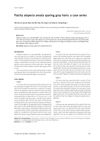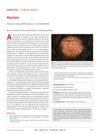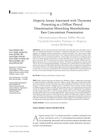 13 citations,
January 2014 in “Postępy Dermatologii i Alergologii”
13 citations,
January 2014 in “Postępy Dermatologii i Alergologii” Patchy alopecia areata can affect only pigmented hairs, leaving gray hairs untouched.
[object Object]  12 citations,
April 2022 in “Dermatology and therapy”
12 citations,
April 2022 in “Dermatology and therapy” Alopecia areata leads to significantly higher healthcare costs due to more doctor visits and prescriptions.
 12 citations,
August 2020 in “JEADV. Journal of the European Academy of Dermatology and Venereology/Journal of the European Academy of Dermatology and Venereology”
12 citations,
August 2020 in “JEADV. Journal of the European Academy of Dermatology and Venereology/Journal of the European Academy of Dermatology and Venereology” Azathioprine is the most continued treatment for chronic alopecia areata over a year, often with added low-dose prednisolone.
 11 citations,
March 2021 in “Dermatology and therapy”
11 citations,
March 2021 in “Dermatology and therapy” Researchers created a new tool to measure the effects of alopecia areata from the patient's view, focusing on hair loss, daily life, and emotional health.
 11 citations,
June 2011 in “Expert Review of Dermatology”
11 citations,
June 2011 in “Expert Review of Dermatology” Skin reactions to drugs are common and can be deadly, usually requiring stopping the drug and may be better prevented with genetic testing in the future.
 10 citations,
May 2017 in “CMAJ. Canadian Medical Association journal”
10 citations,
May 2017 in “CMAJ. Canadian Medical Association journal” The boy had a fungal scalp infection called kerion, which was cured with oral antifungal medication.
 9 citations,
June 2018 in “Scientific Reports”
9 citations,
June 2018 in “Scientific Reports” People with certain types of alopecia have a slightly higher risk of cancer, especially thyroid, bladder, and prostate cancers.
 8 citations,
August 2019 in “Dermatologic surgery”
8 citations,
August 2019 in “Dermatologic surgery” Nonsteroid treatments for alopecia areata show promise but need more high-quality research.
 4 citations,
December 2016 in “Journal of Pakistan Association of Dermatology”
4 citations,
December 2016 in “Journal of Pakistan Association of Dermatology” Using isotretinoin gel and minoxidil solution together effectively regrows hair in most people with patchy hair loss.
 4 citations,
April 2010 in “Expert review of dermatology”
4 citations,
April 2010 in “Expert review of dermatology” Restoring immune privilege in hair follicles could help treat certain types of hair loss.
 3 citations,
July 2021 in “International journal of environmental research and public health/International journal of environmental research and public health”
3 citations,
July 2021 in “International journal of environmental research and public health/International journal of environmental research and public health” Two patients developed complete hair loss after Alemtuzumab treatment for MS, with no regrowth after two years.
 3 citations,
July 2017 in “Elsevier eBooks”
3 citations,
July 2017 in “Elsevier eBooks” Skin reactions are a common reason for emergency visits due to drug allergies, with some severe cases needing intensive care.
 2 citations,
December 2018 in “Journal of cosmetic dermatology”
2 citations,
December 2018 in “Journal of cosmetic dermatology” Higher CRBP1 levels are linked to more severe alopecia areata.
 1 citations,
May 2024 in “Türkiye klinikleri tıp bilimleri dergisi”
1 citations,
May 2024 in “Türkiye klinikleri tıp bilimleri dergisi” A rare case showed hair regrowth after chemotherapy for thymoma, suggesting a link between alopecia areata and thymoma.
 1 citations,
July 2020 in “Journal of cosmetic dermatology”
1 citations,
July 2020 in “Journal of cosmetic dermatology” A woman on immunosuppressants developed two rare scalp conditions, which improved with specific treatments.
 1 citations,
January 2020 in “Benha Journal of Applied Sciences”
1 citations,
January 2020 in “Benha Journal of Applied Sciences” Certain gene variations may increase the risk and severity of alopecia areata.
 1 citations,
May 2017 in “InTech eBooks”
1 citations,
May 2017 in “InTech eBooks” The document concludes that alopecia areata is an unpredictable autoimmune hair loss condition with no cure, but various treatments exist that require personalized approaches.
 1 citations,
October 2013 in “Expert Review of Dermatology”
1 citations,
October 2013 in “Expert Review of Dermatology” Diagnosing alopecia areata is challenging and requires careful examination and various tests to distinguish it from other hair loss types.
 1 citations,
December 2010 in “InnovAiT”
1 citations,
December 2010 in “InnovAiT” The document concludes that accurate diagnosis and appropriate management are crucial for treating various hair disorders, which have significant psychological impacts.
[object Object]  January 2025 in “Acta Dermato Venereologica”
January 2025 in “Acta Dermato Venereologica” Mothers with alopecia areata have a higher risk of adverse birth outcomes.
 March 2024 in “Clinical and experimental dermatology”
March 2024 in “Clinical and experimental dermatology” Topical corticosteroids may be a safe and effective treatment for severe alopecia areata in children.
 December 2023 in “International journal of research in dermatology”
December 2023 in “International journal of research in dermatology” Adding PRP to topical mometasone improves and speeds up alopecia areata treatment.
 July 2023 in “The Egyptian Journal of Hospital Medicine ”
July 2023 in “The Egyptian Journal of Hospital Medicine ” The conclusion is that emotional support and a variety of treatments are important for alopecia areata, but more research is needed.
 June 2023 in “British journal of dermatology/British journal of dermatology, Supplement”
June 2023 in “British journal of dermatology/British journal of dermatology, Supplement” A woman's rare hair loss condition improved on its own, suggesting this type might recover like common cases.
 April 2023 in “Medizinische Genetik”
April 2023 in “Medizinische Genetik” New research has found 14 genes linked to the risk of developing alopecia areata, improving understanding and treatment options.

Liquid nitrogen cryotherapy worked well for many patients with stubborn alopecia areata.
 February 2023 in “Vlaams dierengeneeskundig tijdschrift”
February 2023 in “Vlaams dierengeneeskundig tijdschrift” Two young cats with a severe ear and skin condition improved with immune system-targeting treatments.
 October 2022 in “International Research Journal of Modernization in Engineering Technology and Science”
October 2022 in “International Research Journal of Modernization in Engineering Technology and Science” COVID-19 vaccines may cause hair loss in people who are genetically prone to it.
 October 2021 in “International journal of research in dermatology”
October 2021 in “International journal of research in dermatology” No link between scalp patterns and alopecia severity in children, but more severe cases often had nail abnormalities.
 October 2021 in “Dermatology Reports”
October 2021 in “Dermatology Reports” Higher IL-17A levels indicate more severe alopecia areata.






























